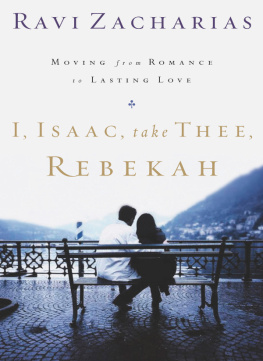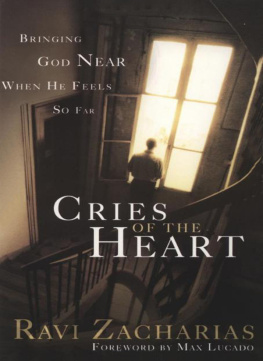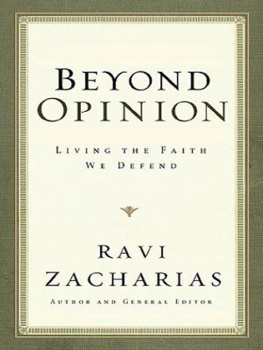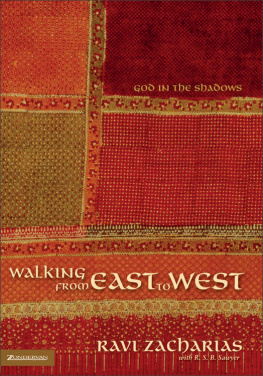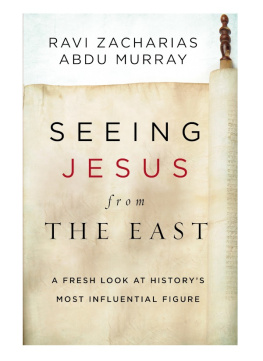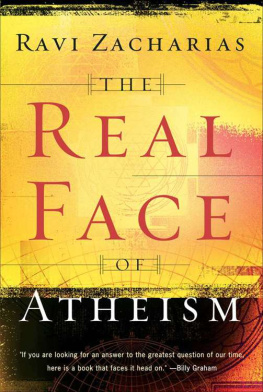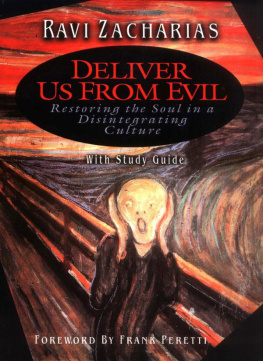O THER B OOKS
BY R AVI Z ACHARIAS
Can Man Live without God
Cries of the Heart
Deliver Us from Evil
Jesus among Other Gods
2004 Ravi Zacharias.
All rights reserved. No portion of this book may be reproduced, stored in a retrieval system, or transmitted in any form or by any meanselectronic, mechanical, photocopy, recording, scanning, or otherexcept for brief quotations in critical reviews or articles, without the prior written permission of the publisher.
Published in Nashville, Tennessee, by Thomas Nelson. Thomas Nelson is a registered trademark of Thomas Nelson, Inc.
Thomas Nelson, Inc. titles may be purchased in bulk for educational, business, fundraising, or sales promotional use. For information, please e-mail
@Thomas Nelson.com.
All Scripture quotations, unless otherwise indicated, are taken from The Holy Bible, New International Version ( NIV ), 1973, 1978, 1984 by International Bible Society. Used by permission of Zondervan Publishing House.
Other Scripture references are from the following sources:
The New King James Version ( NKJV ), 1979, 1980, 1982, Thomas Nelson, Inc., Publishers.
The King James Version of the Bible (KJV).
Library of Congress Cataloging-in-Publication Data
Zacharias, Ravi K.
I, Isaac, take thee, Rebekah / by Ravi Zacharias.
p. cm.
ISBN 978-0-8499-0822-4
1.MarriageReligious aspectsChristianity. 2.MarriageBiblical teaching. 3. Isaac (Biblical patriarch) 4. Rebekah (Biblical matriarch) 5. Bible. O.T. Genesis Criticism, interpretation, etc. I. Title.
BV835.Z33 2004
248.4dc22
2003022171
08 09 10 11 12 QW 9 8 7 6 5
Information about External Hyperlinks in this ebook
Please note that footnotes in this ebook may contain hyperlinks to external websites as part of bibliographic citations. These hyperlinks have not been activated by the publisher, who cannot verify the accuracy of these links beyond the date of publication.
TO JEAN AND LINDSAY REYNOLDS
who have just celebrated their sixtieth anniversary.
A Testimony to God, A Tribute to each other, An Example to us.
With my love and gratitude.
Contents
I n every effort undertaken there are those behind the scenes who work very hard to bring a message to print. I should begin by thanking Dr. James Dobson of Focus on the Family for making the spoken version of this message well-recognized and appreciated all over the world. I must also thank my assistant Nancy Bevers for her encouragement over many years to write these thoughts down. Once I finished the manuscript the workload was carried by my wife,Margie, as she pored over every page. She, of course has edited all my books but of them all, this one made me the most nervous because she was the proofreader not only for the content, but for evaluating its very application in my own life. That was a bit nerve-wracking to me, to say the least. But as always, she was gracious in her critique and contribution. In that sense, the very theme of this book has been lived out by her. How can one gainsay that? My thanks also to Danielle DuRant, my research assistant, for finding some resource help for me and for her contribution in readying the manuscript for publication.
I would be remiss if I did not say a heartfelt word of thanks to our childrenSarah,Naomi and Nathan. They have been understanding, patient and forgiving over the years. With a lifestyle that has involved so much travel over three decades, they could have easily become embittered or cynical. But their love has remained strong and constantly affirming. They are three rays of sunshine when the road of life can sometimes get dark. They make me feel better than I am and that is purely an act of grace. I owe them a debt I cannot repay.
Finally, my sincere thanks to David Moberg, Allen Arnold, and Thomas Nelson, Inc. for the trust they had in assigning this book to me. I am grateful.
R AVI Z ACHARIAS
Atlanta, Georgia
S ome subjects you address because they rise to the top of your thinking and you sense a deep compulsion in your heart about them. No matter what other issues you consider, that one deep, pressing theme makes its way into your conversations or your preaching. Such a theme is timeless, and to fail to deal with it is to fail yourself and others. But sometimes, with the passing of time, the urgency lessens and you move on to other ideas that occupy your thoughts. The momentous subject that once held you captive no longer elicits the same fervor and passion that once overwhelmed you.
The subject of love, romance, and marriage, as I originally addressed it in a sermon of the same title as this book captured my thinking and energy. It may have been because I, too, was making decisions that would shape my future and so felt drawn to the ramifications of these life-defining determinations. It may have also been that for the first time I was keenly aware of the direction our culture was headed and of the seeds that were being sown in society for the destruction of the home.
As the years went by, I found myself thrown constantly into a different arena, where I was called upon to defend the gospel in hostile settings. My mind was inexorably drawn to weightier matters of philosophical debate about truth and belief in God. That still remains my primary locus of speaking.
Yet I have sensed that sooner or later, when outward resistance to the gospel has been dismantled, some very troubling questions lie beneath the surface for the person challenging biblical truth. Young people in particular run into romance and love with an irresistible urge and then begin to wonder if love ever was, indeed, all it was made out to be.
According to a recent study by a major university, the average college student pursues sex without strings and marriage without rings. Physical intimacy is commonplace, considered just another way to have fun. And many young people arent interested in marital commitment. They say that living together is better than the risks of marriage and the hoops they will have to go through to get out of it, the certainty of which is only a matter of time. Yet in the midst of this scene, the average person continues to hope and long that it will be otherwise.
Love is still what people long for. It is still the theme of dreams. Why else do we hear so many songs about love when all around we see shattered dreams and wrecked homes? Why is there such hype about sex when, for many, no one person seems to be able to hold our attraction? Why do we still dream and yearn and hope when those yearnings seem unrequited? Suddenly, the issues that were deemed weightier become less pressing than the matters that directly reflect life and how to live it.
For the last forty years, the home has been under steady attack from various groups, and concepts that were once cherished are now minimized and even mocked. Yet our hunger for love and a lifelong partnership still remains.
In fact, as I write this, I have just returned from the sixtieth anniversary celebration of my wifes parents marriage. Sixty years! What a tribute to them! What an example they are to us who follow after them! Everyone to whom I have mentioned this event has responded in the same way: You dont hear of that very often anymore. A sad commentary, I should say. Such enduring commitment is rare and almost vanishing. One card they received read, The only thing more romantic than newly weds... is oldly weds.Who can deny such a tribute? Our hearts yearn for a love that lasts and is faithful.

